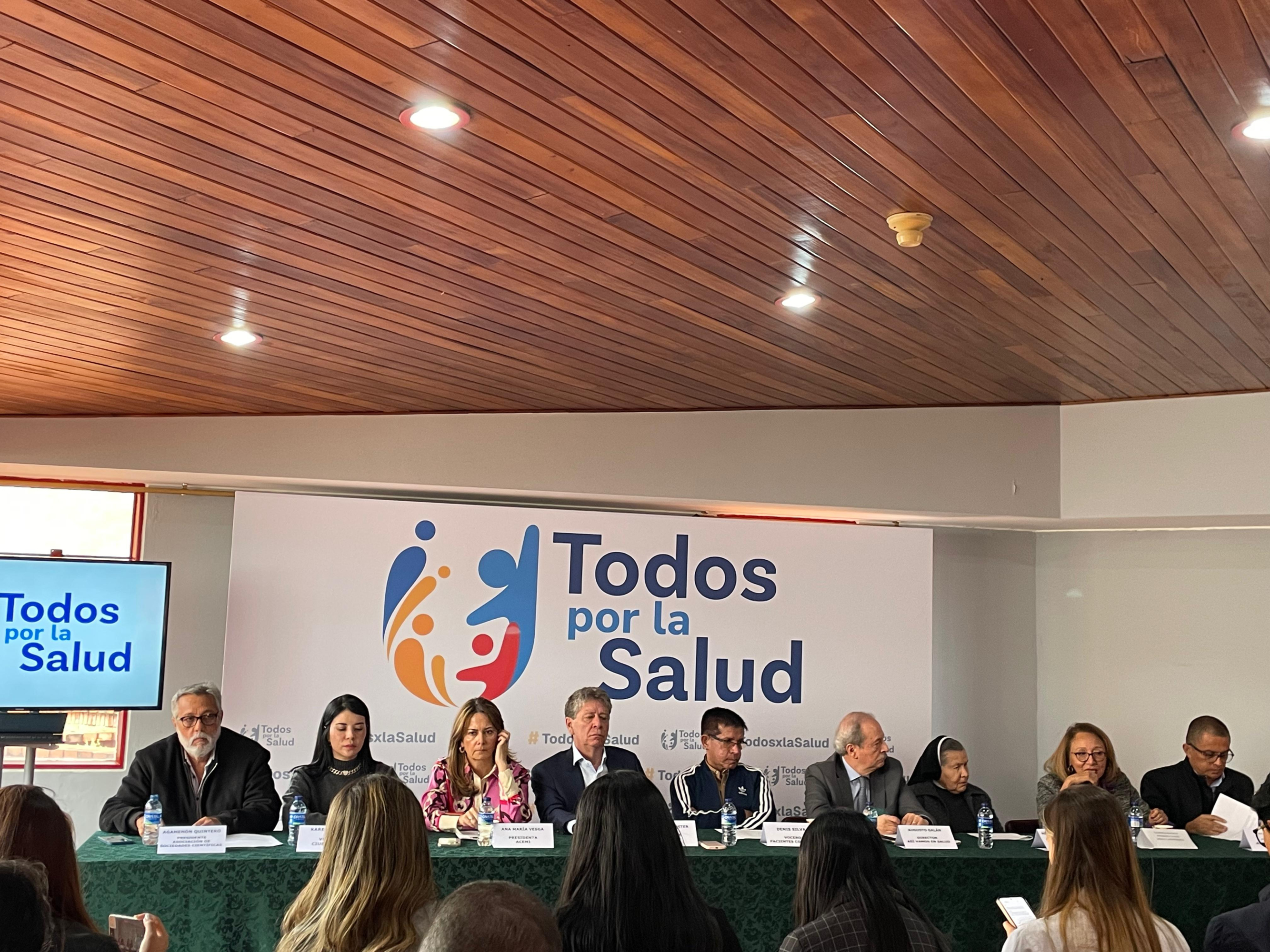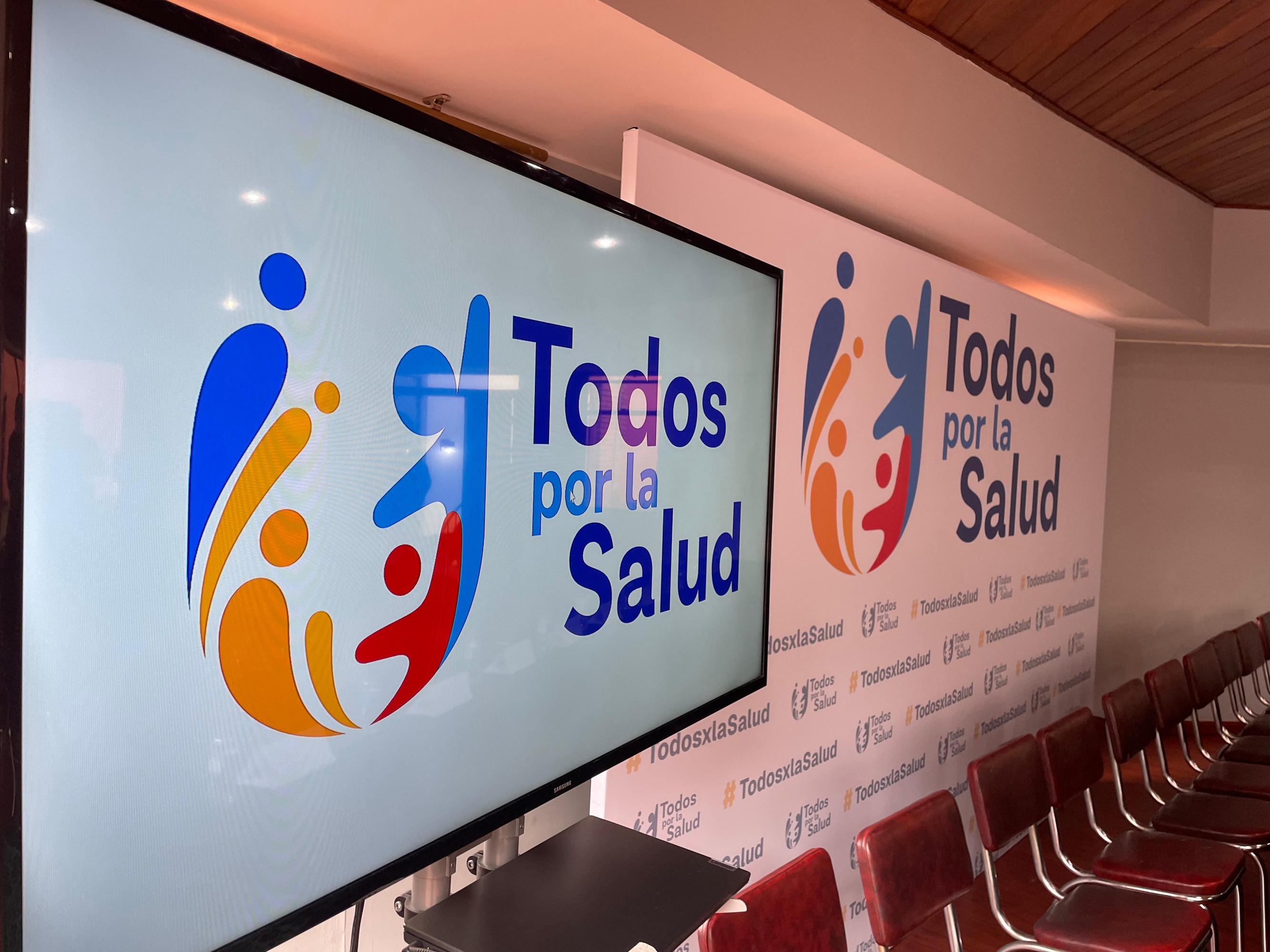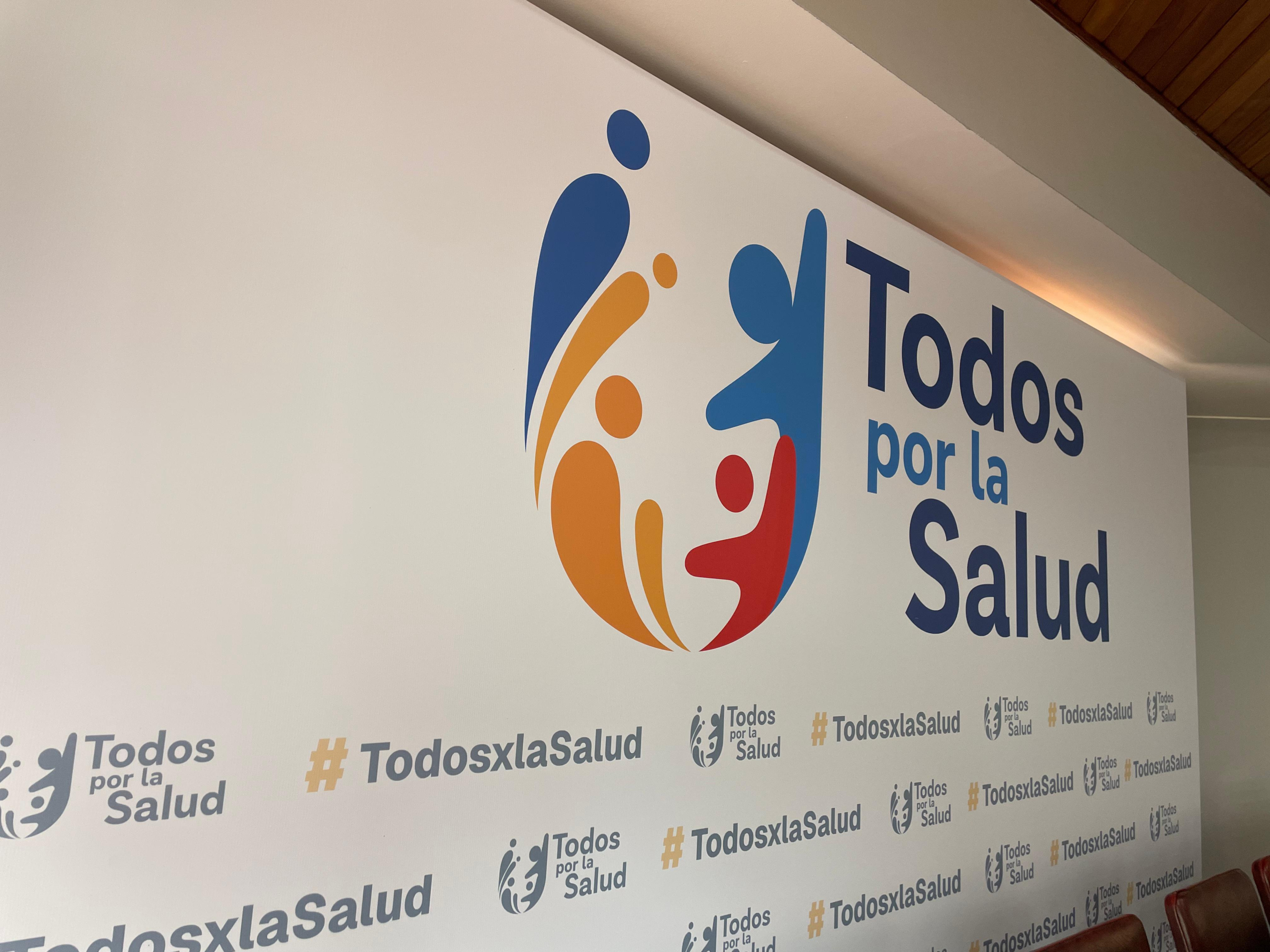The health sector is organizing in the "All for Health" movement to demand a solution to the current crisis in the system.

This Monday, from Bogotá, patients, doctors, healthcare providers, academics, former ministers, and unions presented the "All for Health" movement, a collective that seeks to demand urgent action in response to the current crisis facing the system , a movement that some members of this organization have been denouncing for several months.
Present at the group's presentation were Karen Cortés, citizen spokesperson; Ana María Vesga, president of Acemi; Agamenón Quintero, president of the Association of Scientific Societies; Bruce Mac Master, president of Andi; Denis Silva, spokesperson for Pacientes Colombia; Augusto Galán, director of Así Vamos en Salud; Sister María Inés Delgado, spokesperson for Pacientes Colombia; Clemencia Mayorga, president of the Medical Association of Cundinamarca; Alvaro Molina, spokesperson for user associations; former Minister of Health Alejandro Gaviria; and Representative Andrés Forero, among others.

The various actors in the "Everyone for Health" movement made an urgent appeal to the government. Photo: Edwin Caicedo. EL TIEMPO
According to the various stakeholders, this initiative emerged from patients and users, who called on unions, medical organizations, and other stakeholders to join forces to demand the same thing from the government: it is urgent that measures be taken to address the current situation, which, they noted, is unprecedented.
The movement also presented a list of ten urgent demands to end the humanitarian crisis, with ten demands to address the current crisis, which the group describes as a "humanitarian crisis" that will leave "thousands of deaths."
Among the demands are immediate government recognition of the crisis; immediate access to medical appointments for patients; an increase in hospital beds in response to the sustained shortages seen in recent months; genuine dialogue and participation between the government and the various stakeholders; compliance with court orders, including those related to the UPC; and the protection of human talent, which has been affected by the current situation; among others.
To launch an urgent call for action, the organization will take several actions, such as bringing cases of patients affected by the crisis to the Inter-American Court of Human Rights; asking people to join social media using the hashtag #TodosxlaSalud to share how the current crisis is affecting them; and calling on the government to comply with the Constitutional Court's rulings on the UPC. Among other actions, the organization will continue to focus on the work of the UPC.

The "Everyone for Health" movement was launched this Monday, May 19, in Bogotá. Photo: Edwin Caicedo. EL TIEMPO
According to Sister María Inés Delgado, spokesperson for Pacientes Colombia and a member of the Bethlemitas religious community, there are no "words to express the families' pain." She said she has seen cases of "broken" families affected by the increasing barriers to accessing healthcare.
“Day after day, you see patients saying: ‘We can't take it anymore, we're tired, they're killing us little by little.’ (...) Yes, there was a crisis before, but the crisis we're in today is unprecedented. It's a crisis of indifference and lies. Don't blame others; assume your responsibility. May the Lord enlighten you so that you're capable of not remaining stuck in your ideology. Let's not continue dividing the Colombian people,” Delgado demanded.
For his part, Augusto Galán, director of Así Vamos en Salud, expressed his concern about the draft decree with which the government seeks to transform the healthcare system and which has been circulating in recent days. According to the expert, the document lacks legal basis, represents an operational risk, and reflects regulatory overreach. For Galán, the government has not presented a clear and structured plan for the transformation of the system, and he warned that this is not the time for improvisation or political retaliation.
“This is not the time for experiments or political retaliation, but rather to implement what truly works and protect life with evidence. This draft decree should not move forward because it constitutes regulatory overreach, lacks legal support, and represents an operational risk. The health of Colombians cannot be subject to ideological confrontation. This is never the time to destroy, much less now. Reform is necessary, but with good judgment, through consensus, not confrontation,” Galán warned.

The "Everyone for Health" movement includes various stakeholders in the health system. Photo: Edwin Caicedo. EL TIEMPO
Regarding the unions, Bruce Mac Master, president of the National Association of Businessmen of Colombia (Andi), emphasized the urgency of a collective response to the crisis in the country's healthcare system and stated that the current situation must be understood as a humanitarian crisis that could worsen, leading to hundreds of deaths. In this regard, he called for national unity to find effective solutions to overcome the critical moment the sector is going through.
“We decided to unite and be active because the slogan 'Everyone for Health' truly represents the soul of this movement. In the end, we are all, or will all be, patients one day. We have no hesitation in calling this a humanitarian crisis. More people in Colombia may die if we don't act. Our goal is clear: to resolve and end the humanitarian crisis we are experiencing today,” the union leader emphasized.
On behalf of patients, Denis Silva, spokesperson for the organization Pacientes Colombia, denounced the serious deterioration in access to health services in different regions of the country. He noted that in cities such as Bucaramanga, Cali, Medellín, and Barranquilla, patients are speaking out against the lack of medication delivery, the lack of medical appointments, and the shortage of hospital beds. Silva noted that more than 9,500 beds have been closed in recent months, which is particularly affecting vulnerable populations, especially children.
“While we're here, in Bucaramanga, Cali, Medellín, and Barranquilla, patients are raising their hands because their medications aren't being delivered. Today, we can't find appointments or hospital beds. More than 9,500 beds have been closed. Could it be that this government doesn't care about children? Today, all Colombians with any medical condition are at risk,” Silva emphasized.
Presentation of "Everyone for Health." Photo: Edwin Caicedo. EL TIEMPO
Ana María Vesga, president of the Colombian Association of Integral Medicine Companies (ACEMI), affirmed that the Colombian healthcare system is experiencing its most serious crisis since the implementation of Law 100. According to Vesga, the current discussion on healthcare reform lacks technical and scientific rigor, and patients have been relegated to the background.
The board warned about the serious financial backlog resulting from high accident rates, which has particularly impacted the EPSs, with a growing number of complaints and claims, many of which have been intervened. According to the leader, the system is undergoing a process of institutional collapse, which the intervention of the Superintendency of Health and the Government has not resolved, but, on the contrary, has worsened the situation.
“This is the worst crisis we've experienced since Law 100 was passed, amidst a debate that lacked technical and scientific knowledge, leaving patients at the bottom of the list. The claims rate today leaves a huge financial backlog. The EPSs with the most losses are also those with the most complaints and claims, and the intervention of the Supersalud (Health Superintendency) hasn't been the solution either. The system is crumbling within its institutions. That's why we have to think: what's next?” Vesga emphasized.
On behalf of healthcare workers, Clemencia Mayorga, president of the Cundinamarca Medical Association, demanded an urgent solution and dignified working conditions for healthcare workers, who have also been affected by the crisis. “Healthcare workers demand a solution. It's incredible that in Colombia we have doctors who are owed six or even eight months of salaries. We believe that the current healthcare reform lacks a basis,” said Mayorga.
Finally, doctor and citizen spokesperson Karen Cortés emphasized that the movement is not defending any ideology, but rather defending life. “As a healthcare worker, I also see a major flaw. We are facing a failure in the social rule of law. The crisis in the healthcare system cannot be addressed with polarization or propaganda,” Cortés emphasized.
Environment and Health Journalist
eltiempo




